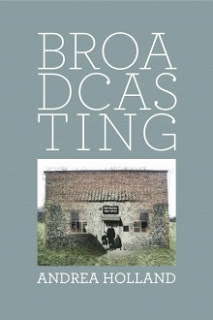The Café Writers Norfolk Commission was established five years ago by the Norwich-based writers network Café Writers, in collaboration with Ink Sweat & Tears, under the patronage of Kate Birch and Dominic Christian, and published by Gatehouse Press.
Every year, Norfolk poets are invited to submit a proposal for a new body of work that responds to Norfolk in some way. Andrea Holland’s winning proposal Broadcasting focussed around the war effort in Breckland and what particularly interested the judges was that Andrea wanted to explore almost-forgotten local history.
Andrea writes on her website: ‘The names of villages and the people who had to leave their homes in July 1942 became real to me after my second visit to the Thetford STANTA (Stanford Training Area) military base in May 2012. In a chilly Nissan hut I spent hours staring at black and white photos which had been donated to STANTA by ex-residents; each wall of the room had the name of one of the villages above it: Stanford, West Tofts, Sturston, Tottington, Buckenham Tofts.
I knew that I would have to write about both real and imaginary villagers who gave up their homes and their land, for what would have been described as ‘the war effort’. So in that cold Nissan hut at STANTA, many of the villagers in photos stuck on the walls began to talk to me…’
Here are three poems from Broadcasting, which is launched this evening at Cafe Writers, Take 5 in Tombland, Norwich.
Broadcasting
- Mousehall cottages are asleep with bramble,
the pin pricks of a fierce witch riding on the wind.
A wasp knocks at the window, cracked chimneys
whistle in the like of a farmer for his dog.
The bricks shift in their sleep, remembering kitchen
fires and children. The dog at the heels
of an orphan lamb.
- Birds and weed sew seed in the crop-less field,
hand-stitched into sleep: white bryony, nettles,
fat hen and night shade. We are broadcasting
with them. We are rooted in the sestina of sleep
and seed. The ring of pines which line the fields
watch over thirteen-thousand sheep who ignore
the trees’ summons, come by, come by.
Rabbit
for breakfast, a little gritty off the bone
but meat is meat and the rest is for
the chickens and dog.
Cold rabbit for lunch and windfalls
a blessing, for afters.
Rabbit for supper in a grey stew,
propped up by fat parsnips and potatoes
knuckled with gout.
Sinew, pelt, claw and bone: the trap
as provider, above churn or chicken.
The black skins of rabbit lie
across Nana’s knees as the fire
darkens down.
The rabbits dream of warreners,
legs jerking as if already caught by the black
toothed arch.
The warreners dream of rabbits,
fingers jumping as if to ready for the snap
of each small neck.
Five Prepositions at the Village School
Over:
five bicycles of seven in the racks
need oil in the chain. Just before playtime,
the roof shakes under machine gun strafe
like freak hail.
Under:
the shale-coloured slate the school walls
tremble: They learn the German for punish
is strafe, as in Gott Strafe England.
Between:
pale lidded desks, amongst inkwells stained
with the knowledge of blue, children continue
their sums: Adding up and subtraction is easy,
division is more difficult for some.
Against:
the cloakroom door, a boy touches the waist
of a nervous girl; his father is in France,
in six weeks time their house will be empty.
Across:
the playground, boys count empty casings
and girls cartwheel home, both firmly
located in space and time.
Andrea Holland’s first collection Borrowed was published by Smith/Doorstop Press. She was a runner-up for the 2010 Mslexia poetry competition. She also writes short stories and has been commissioned to work with visual artists for several collaborative projects, including for the Norfolk & Norwich Festival, and for Creative Arts East. Andrea teaches Creative Writing at the University of East Anglia and works as a freelance editor, as an Editor for The Poetry Archive and tutor in writing and English as a second language.

